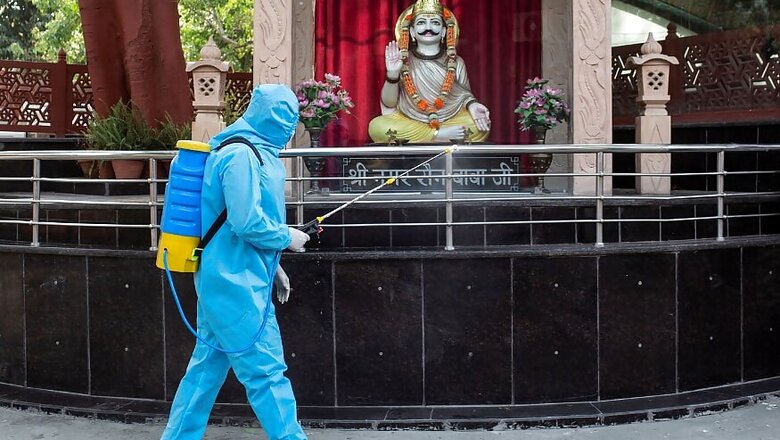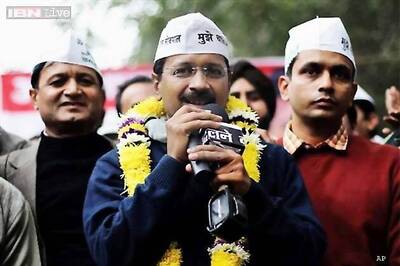
views
The vigour with which India launched its battle against coronavirus has created ripples all over the world. The display of unity amidst diversity is at its finest during the country's fight against the unseen enemy. The impossible, rather the unexpected, seems to be happening, at last. Minority mainstreaming, which Prime Minisrer Narendra Modi had declared as one of his primary concerns after the elections, seems to have emerged as a proximate reality as opposed to a distant dream. The coronavirus scare seems to have dealt a jolt to the communal scare that had gripped the country.
The agitation on the streets, in the backdrop of the Citizenship Amendment Act, pointed to a possible polarisation of minds along sectarian lines fanned by external forces, aided and abetted by political rivals. The silent majority found in the agitation, the beginning of an end of social harmony.
Then came the coronavirus and with it a sea of change in the attitudes of both, the minorities and the presiding majority. The moves were quick and swift. Grand Mufti of Muslims in India, Kanthapuram Aboobacker Haji, reverentially referred to as Ustad or Sheik Sahab, came to Delhi and held detailed parleys with the top brass of the ruling dispensation. Issues were discussed, fears allayed, areas of convergence identified, consensus arrived at and then, there was no looking back. The Grand Mufti had no doubt in his mind that the Muslims of India are an integral part of its social fabric and will remain so.
With the ice broken, the stage set, the Grand Mufti and his team met Modi and Home Minister Amit Shah. As the Grand Mufti told this author, it was all sweetness in his meetings with the duo. The new-found camaraderie resulted in tangible action.
Coincidentally, the meeting between the Grand Mufti and Modi took place on the eve of the lockdown. The coronavirus pandemic served as a raison d’etre for “acts of kindness and of love” on both sides. The Grand Mufti wrote to Modi offering all possible assistance from his army of volunteers and the institutions, to combat the coronavirus menace. He stated in unequivocal terms that they were against holding congregational prayers during the coronavirus war as that would upset the vital requirements of social distancing.
In the context of the Nizamuddin incident, the mufti's position was pregnant with meaning and proved to be a shot in the arm for social harmony in the nation. He wrote to Modi: “In order to avoid public or private crowding, we have stopped religious congregations including the Friday prayers, weddings and other social gatherings.”
As this path-breaking development took shape in Delhi, Cardinal Oswald Gracias of Mumbai, President of the Catholic Bishops Conference of India, wrote to Modi that all the personnel and institutions under the church would be left at the service of the nation in its efforts to contain and combat the pandemic.
The coronavirus seems to have emerged as a binding force that knit India with the gossamer thread of social harmony. But where does this new honeymooning take the nation to – a bright future or a bleak interlude? The need of the hour seems to be the formation of a Social Integration Council at the national and state level. This council should emerge as an effective platform where the representatives of various communities can sit together and discuss matters of mutual and national interest. It should be not just a talking shop, but a forum where issues are discussed before any key discussion is taken. The preposterous political game, in which decision precedes discussion, has had its causalities on the streets.
Democracy, should in no case, descend to ‘mobocracy’. Voice of the people is the voice of God; but genuine voices can also be mimicked beyond recognition. The voice of sanity should prevail over the nation. The coronavirus situation has taught the nation how to come together for survival. The pandemic seems to have awakened the well-meaning people who started finding ghosts behind every wall. Suddenly, India seems to have entered into the Amar-Akbar-Anthony mood.
It now seems that coronavirus scare came as an accidental boon, binding the society together. A boon which came as an accident should not be lost accidentally. If the nation fools around with this Godsend opportunity, the new generation will say, “The hell is empty all the devils are here.”
The coronavirus has taught us to increase physical distance and decrease mental distance. Lord Nelson said, “England expects every man to do his duty.” Our Prime minister also has given a similar call, and the entire nation responded to it enthusiastically. Of course, in a country with 1.3 billion people, some instances of aberration cannot be wished away.
The nation witnessed the coming together of civil society organisations all over the country. The Catholic coalition for health came forward, offering 60,000 beds spread over their 1000 hospitals in the country for Covid-19 treatment. The dedicated volunteers of Seva Bharati, ISKCON, Satya Sai Trust, Mata Amritanandamai, Jagad Guru Swami Isha, Sree Sree Ravishankar, Malliayoor Mutt and a host of other individuals and institutions took it as their bounden duty to work 24/7 to contain this menace and bring succour to the suffering of millions. The RSS is present and is setting examples in quiet efficiency in social service.
Our children repeat this line every day in their school assembly, “India is my country; all Indians are my brothers and sisters.” Now, the whole nation realises what it means. We were experiencing a sense of disconnect from each other, our neighbours, our families, nature, and even ourselves. Covid-19 has connected us; it is for us to make sure that we stay connected.
(The author is a retired IAS Officer. Views expressed are personal.)


















Comments
0 comment